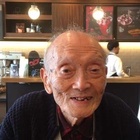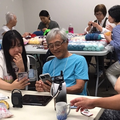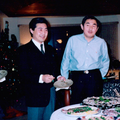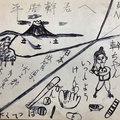Tak was 19 when his family was exiled from Canada to Japan. There were various reasons why his parents chose exile to Japan over dispersal to eastern Canada. One was uncertainty about what would happen if they chose the latter. They were also concerned about the welfare of close relatives in Japan with whom they had lost contact during the war. Another factor was that his father still owned a house in Miomura whereas in Canada he had lost everything. Tak explains,
I think the decision was mainly due to the fact that we had no assets (in Canada), but dad had a house he owned in Japan and at least that was a roof over our heads, whereas going to eastern Canada meant too many unknowns: Will we be welcome? How will we support ourselves without a place to live, etc.? Also, I think my parents were concerned about how their parents were faring. We learned later that they were all well, which was a great relief…When we arrived in Japan the biological parents of both my father and mother were still in good health. My father’s biological father had returned to Japan before the war.
Tak does not recall whether he himself was against going to Japan or not. “My siblings and I just did as our parents decided. It was tough going at times, but youth was on our side and we made the best of things. We never regretted the decision.” He has several recollections of the voyage:
Quite a number of passengers suffered seasickness. I didn’t and was involved in comforting those who did. I don’t remember the purpose, but I had a portable typewriter and I was requested to type up a list of all the passengers. I only learned this later, but there was a Canadian passenger onboard our ship, a Mr. Herbert Norman, who was on his way to Tokyo to represent Canada at the Canadian Legation (later changed to The Embassy of Canada) in Japan after World War II.”
During the voyage, I befriended the ship’s chef. He took a liking to me and, knowing the conditions in Japan from his previous visits, he tried very hard to get me to stay on board and not land at Japan. The chef was like a second in command of the ship next to the captain, and since I would not take his advice, he put together a very large bag full of rolls from the bakery and gave it to me. This fed our family for a few days after landing.
Tak also recalls the awful conditions, particularly the food, during his time at the repatriation center at Kurihama upon arriving in Japan.
We arrived at Kurihama, near Tokyo. It was August and it was hot and humid with a lot of mosquitos. Our holding quarters were in a large wooden building. It could have been army barracks, but I don’t know. There were mosquito nettings and we slept inside the netting. I don’t remember much about the food except that there was very little and it was hard to tell what it was. There was a soup-like dish we used to call “dishwater.”
He also remembers the arduous train journey from Tokyo to Wakayama.
The trains were crowded and everybody was fighting to get on. Some even climbed through the windows instead of the doors. There were many tunnels en route and soot from the coal burners filtered into the coaches. We also had to keep a close watch on our baggage lest someone steal it.
Tak’s parents had very little money when they arrived in Wakayama. His father turned to farming and raised rice and vegetables on the family’s land in Miomura, but the situation was not good. He says, “At first, it was a matter of finding work so that we could live. Nothing else came into my mind.”
In contrast to the experience of many of the exiles, Tak does not recall being discriminated against by relatives and fellow-villagers, or being bullied by other teenagers. Because he had studied Japanese at the Vancouver Japanese Language School and practiced it further as a member of the Buddhist youth group during his incarceration at Lemon Creek, he did not have serious problems with daily communication.
Also, because so many people had emigrated to Canada from Miomura, the people of the village were relatively used to household members coming back and forth from Canada and hence were more accepting than those of other villages. Yet, he does recall “some feeling of envy on the part of the locals because what little we had brought from Canada was still very desirable to the locals who had less.”
He felt very discontented with the primitive living conditions in Miomura. There was no piped water or plumbing system—so no flushing toilet, and the heating was poor. Realizing that he had no economic future there, after only a month he went to Tokyo where he was able to quickly find employment (including room and board) with the Occupation Forces base at what is now Haneda Airport. Hence, he does not recall suffering real hunger as so many others did. Nor does he recall having other serious problems in his daily life “except for sitting on the tatami and using the old Japanese style toilets. After all these years, I am still uncomfortable with both. Fortunately, present day Japan is quite different and the toilets are even better than elsewhere.”
Although he had a good basic grounding in spoken Japanese, he did occasionally experience some difficulty with the language during the early years and was continually having to consult dictionaries for both English and Japanese at his work. Eventually he came to feel more proficient though he never felt he had reached the point that he could stop studying. As it was necessary for him to go out and make a living, continuing his education was out of the question. He says, “Instead of going to school, I tried to teach myself. I am a very curious person by nature and asked my friends a lot of questions. Also, I learned by osmosis.” Hence his adjustment to Japan was relatively smooth compared to others.
He does remember missing his life and friends in Canada, especially the latter. “I missed my friends more than the life… ‘Life in Canada’ to me was as a boy living in an almost completely Japanese community from birth at 1926 until 1942 when they shipped me to Lemon Creek internment camp. And then I came straight to Japan from Lemon Creek.”
Unlike the other members of his family members, Tak would live the rest of his life in Japan. He does not recall his parents talking much about Canada after they returned to Japan, partly because he did not live with them (he had moved to Tokyo shortly after arrival in Japan), and when they did talk other topics predominated the conversations. Likewise, they apparently never discussed whether Tak should return to Canada. He says, “I think my parents wanted me to make my own life choices.” He himself also never really felt like living in Canada again, partly due to the financial and other formidable obstacles which he felt would be waiting for him if he ever moved there.
However, his siblings and parents eventually would leave Japan again—not for Canada, but for Hawaii. His sister Masumi (Marie) lived seven years in Japan and moved to Hawaii after marrying an American serviceman. Another sister, Mikiyo (Miki), stayed nine years and was still single when she went to Hawaii, where she ended up marrying the brother of Marie’s husband. Tak’s younger brother, Takumi, lived fourteen years in Japan where he finished junior high school before he was sponsored by his sisters to immigrate to Hawaii.
Likewise, the parents eventually followed their children and moved to Hawaii. Later they moved with Takumi to San Francisco where he attended university. He graduated as an electronics engineer, but ended up in the restaurant business, becoming the owner of a very successful Japanese restaurant called the Bushitei.
* This series is an abridged version of a paper titled, “A Japanese Canadian Teenage Exile: The Life History of Takeshi (Tak) Matsuba,” published in Language and Culture: The Journal of the Institute for Language and Culture, Konan University, March 2020.
© 2020 Stanley Kirk







